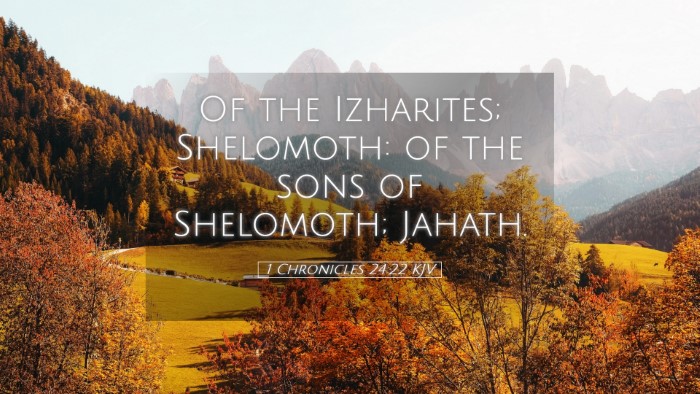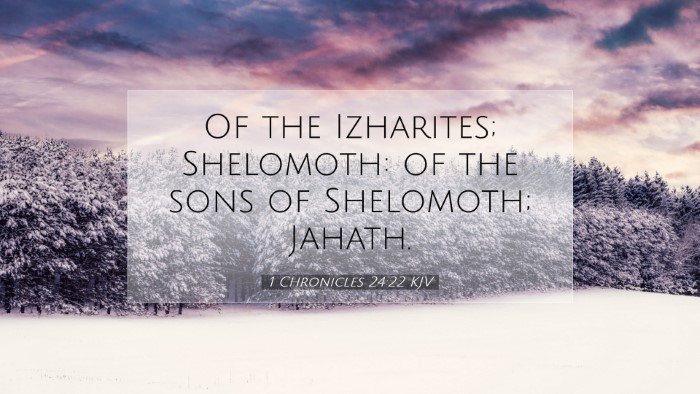Commentary on 1 Chronicles 24:22
Verse Text: "The son of Amram, Ahijah; and the son of Ahijah, Ahitub."
This verse is a part of the detailed genealogical records found in the book of 1 Chronicles, specifically focusing on the division of the Levites. The chapter outlines the organization of the priests according to their families.
Contextual Background
The genealogical lists in Chronicles are significant for several reasons, serving to remind Israel of its heritage, access to priestly duties, and a reminder of the covenantal responsibilities that came with the Levitical lineage. This verse locates the lineage of the high priests, emphasizing the importance of maintaining proper priestly roles and functions in worship and community life.
Insights from Commentaries
Matthew Henry's Commentary
Matthew Henry emphasizes the importance of genealogical records in demonstrating God's faithfulness to His promises, particularly concerning the priestly line. He notes that the record of Ahijah and his son Ahitub signifies a continued divine order and the faithful transmission of priestly duties. Henry points out that these names may not be familiar to many but that they represent a legacy of service before God.
Albert Barnes' Notes on the Bible
Albert Barnes elaborates on the significance of the names mentioned, particularly focusing on the roles of the Amramites within the priestly tribe. He notes that Amram is a notable figure as the father of Moses, Aaron, and Miriam and highlights the importance of the priestly line that follows from him. Barnes suggests that the mention of Ahitub brings attention to the high priestly lineage, which was crucial for both historical context and religious observance in Israel. He also alludes to the practical implications for worship and sacrifice that arose from the clear separation and identification of priestly families.
Adam Clarke's Commentary
Adam Clarke examines the names mentioned within the verses, noting that Ahijah is a common name which means "my brother is Jehovah." Clarke emphasizes the theological implications of the priestly lineage, suggesting it reflects a divine order in worship. He delves into the etymology of Ahijah and Ahitub, discussing how understanding their meanings can enhance a reader's appreciation of their role within the historical narrative of Israel's spiritual life. Clarke also discusses the cultural and religious implications of priests being descendants of well-recognized figures such as Amram, establishing a divine legitimacy to their authority in religious matters.
Theological Implications
The genealogy provided in 1 Chronicles 24:22 opens a deeper discussion on the themes of priesthood, covenant, and God's faithfulness. The genealogy reassures the people of Israel that God has preserved a line through whom they can connect to His holiness. As pastors and students reflect on this verse, they may consider the following:
- Divine Order: The structured listing of names reflects God's meticulous plan in preserving His people and ensuring that worship continues appropriately.
- Covenant Faithfulness: Each name represents generations that have upheld God's covenant, reminding believers of the importance of faithfulness and legacy.
- Role of the Priesthood: The examination of this lineage urges contemporary readers to reflect on the role of spiritual leaders today and stand in the continuity of God's purpose.
Practical Applications
From a pastoral and theological standpoint, the study of 1 Chronicles 24:22 invites reflection on the nature of ministry and the importance of maintaining a legacy of faithfulness. Here are practical applications for today's leaders:
- Legacy of Faith: Church leaders should cultivate an understanding of their spiritual heritage and strive to pass on the faith to future generations.
- Identity in Christ: Just as the lineage of priests was important for Israel, church leaders today draw their identity from being part of Christ’s family, the ultimate High Priest.
- Covenant Responsibilities: Reflecting on the duties of the priesthood, leaders are reminded of their responsibilities in teaching, guiding, and serving their congregations faithfully.
Conclusion
1 Chronicles 24:22 may seem like a mere listing of names, but within these few words lies a profound testament to God’s unfailing commitment to His covenant people. Pastors and scholars are called to draw lessons from the priestly lineage, recognizing the value of history, legacy, and divine arrangement in the life of the church today. This verse encourages a deeper appreciation for the continuity of God's work through faithful servants across generations.


